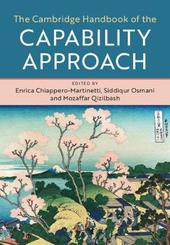
|
The Cambridge Handbook of the Capability Approach
Hardback
Main Details
Description
This landmark handbook collects in a single volume the current state of cutting-edge research on the capability approach. It includes a comprehensive introduction to the approach as well as new research from leading scholars in this increasingly influential multi-disciplinary field, including the pioneers of capability research, Martha C. Nussbaum and Amartya Sen. Incorporating both approachable introductory chapters and more in-depth analysis relating to the central philosophical, conceptual and theoretical issues of capability research, this handbook also includes analytical and measurement tools, as well as policy approaches which have emerged in the recent literature. The handbook will be an invaluable resource for students approaching the capability approach for the first time as well as for researchers engaged in advanced research in a wide range of disciplines, including development studies, economics, gender studies, political science and political philosophy.
Author Biography
Enrica Chiappero-Martinetti is Full Professor of Economics and Head of the Department of Political and Social Sciences at the University of Pavia. She teaches economics, human progress and sustainable development, development economics and cooperation at undergraduate and graduate levels. She has acted as Vice-President of the Human Development and Capability Association and currently serves that Association as editor of the Journal of Human Development and Capabilities. Siddiqur Rahman Osmani is Professor of Development Economics in the Department of Accounting, Finance and Economics at Ulster University. He has published widely on issues related to poverty, inequality, hunger, famine, nutrition, microcredit, rights-based approach to development, and development problems in general. He has been an editor of the Journal of Human Development and Capabilities and served on the editorial board of a number of development-related journals. Mozaffar Qizilbash is Honorary Professor in the Departments of Economics and Philosophy at the University of York. He has published in journals in the fields of economics, philosophy and development studies. He has acted as Editor-at-Large as well as Vice-President of the Human Development and Capability Association and as an editor of the Journal of Human Development.
Reviews'Starting with Amartya Sen's seminal 1979 Tanner Lectures, the capabilities approach has come to occupy a major space in economics and philosophy. The handbook's audacious range, covering the subject's historical roots, summarizing econometric techniques to operationalize it, evaluating its inter-connection with traditional welfare economics, and also to the mysteries of nature and the role of wonder - make it an intellectual feast. I have no doubt that the book will become the most important compendium on the subject.' Kaushik Basu, Cornell University 'This volume situates the capability approach to justice historically and philosophically, provides a record of its achievements in modeling and measuring a vital aspect of human flourishing, and identifies a continuing program of promising research and reflection. Looking back and looking forward, it is an essential handbook for novices and experts alike.' Philip Pettit, Princeton University & Australian National University 'Understanding the capability approach is a great challenge, given the wide range of disciplines and debates involved. This handbook will greatly help those taking up that challenge. It includes chapters on the historical roots of the capability approach, philosophical debates, questions of measurement and evaluation, and questions of public policy and social concerns. This major contribution will be required reading for all students and scholars of the capability approach.' Ingrid Robeyns, Utrecht University
|